|
|
|
Sort Order |
|
|
|
Items / Page
|
|
|
|
|
|
|
| Srl | Item |
| 1 |
ID:
121814
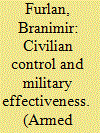

|
|
|
|
|
| Publication |
2013.
|
| Summary/Abstract |
This article gives an overview of how civilian control of the military in Slovenia is implemented in practice. It utilizes the perspective of the controlled entity itself, that is, the Slovenian Armed Forces. The findings show the type and characteristics of civilian control in Slovenia and how they hinder military effectiveness. As one of the European transition countries to have concluded the democratization of its civil-military relations, civilian control over Slovenia's Armed Forces is now in place; however, the control mechanisms have had several debilitating effects on the country's armed forces-the democratization of civil-military relations has been achieved at the partial expense of military effectiveness. Because of this experience, the Slovenian case could serve as an example of how successful democratization of civil-military relations can sometimes produce negative outcomes, or collateral damage, for the military, especially when the employers of the control mechanisms are not aware of the effects that the exercise of their control might have on the military's ability to execute core missions. Methodologically, this article brings an approach for analyzing interrelations between civilian control and military effectiveness.
|
|
|
|
|
|
|
|
|
|
|
|
|
|
|
|
| 2 |
ID:
181158
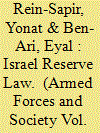

|
|
|
|
|
| Summary/Abstract |
Enacted in 2008, 60 years after Israel Defense Forces was established, the Israeli Reserves Law is a striking expression of the decline of military autonomy in a democratic country. While not aimed at reducing the military’s discretion in regard to the training, deployment, and compensation for reservists, the formal enactment of the Law in effect did so. The legislative process was preceded by a crisis between reservists and the military and was led by several reservists’ organizations who tried to improve the standing and resources allocated to the reserve forces. The article analyzes the impact of these organizations and the coalitions they created with politicians serving in the national parliament, the Knesset. By choosing the legislative option to improve the conditions of service for reservists, they de facto reduced military autonomy since the new Law mandated supervision and monitoring (by civilian institutions) of the service of reservists and extended into the core area of military action, the operational use of force. Thus, the actions of reservists’ organizations turned a bilateral tie between the military and its (reserve) soldiers into a trilateral one, comprising the military, reserve soldiers, and state institutions.
|
|
|
|
|
|
|
|
|
|
|
|
|
|
|
|
| 3 |
ID:
124992
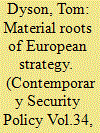

|
|
|
|
|
| Publication |
2013.
|
| Summary/Abstract |
This article undertakes a critical examination of the analytical leverage provided by the literature on strategic culture in explaining the development of the European Union's Common Security and Defence Policy (CSDP). It posits that patterns of progress and stasis in CSDP cannot be fully explained by processes of normative convergence and the resilience of national strategic cultures. Instead, the article argues that a focus on material power sheds greater light on the dynamics driving and hindering Europe's quest for military autonomy. It highlights how the 'balance of threat' is fostering both convergence and differentiation in the defence policies of Britain, France, and Germany. Through case studies of the development of British, French, and German policy towards CSDP and NATO, the article demonstrates the important roles played by energy dependency and geographical position in determining the willingness of European states to embed their defence policies in NATO/CSDP or pursue national strategic autonomy. The article argues that strategic culture can provide valuable insights into European defence cooperation; however, this contribution is best framed within the theoretical insights of neoclassical realism. By highlighting the nature of the variables determining the scope and depth of European defence cooperation, the article raises a number of policy implications for European security.
|
|
|
|
|
|
|
|
|
|
|
|
|
|
|
|
| 4 |
ID:
189925
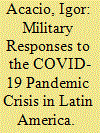

|
|
|
|
|
| Summary/Abstract |
The military in Latin America has been extensively involved in pandemic relief operations. This paper analyses the impact of militarization of pandemic relief operations on human rights. It argues that not all militarization is equally harmful to individuals in the region. When troops assume responsibilities regarding medical care and logistical support, human rights violations do not follow. When involved in policing the stay-at-home orders, the extent of human rights violations is explained by the level of operational autonomy the military has in public security operations. The more autonomous the military, more likely abuses are to occur. Additionally, military exposure to judicial prosecution for human rights offenses contributes to the explanation. After gathering original empirical evidence from 14 Latin American democracies on military presence in pandemic relief, we draw our inferences from process tracing on four comparative case studies of Argentina, Brazil, Chile, and El Salvador.
|
|
|
|
|
|
|
|
|
|
|
|
|
|
|
|
| 5 |
ID:
160697
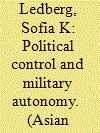

|
|
|
|
|
| Summary/Abstract |
The first part of this article discusses the most common theoretical and analytical approaches to the study of political control over the armed forces in China. It argues that the focus on professionalism and professionalization at the level of the military institution that is common in previous studies has certain limitations when analyzing Chinese civil–military relations. Against this background, the second part of the article suggests an alternative approach that places the Chinese officer corps and its professional autonomy at the center of analysis. Its benefit is demonstrated in a case study of quality control at China’s top three military education institutes. The study shows that autonomy and direct political control varies, which indicate a need for more nuanced discussions about military professionalization in China.
|
|
|
|
|
|
|
|
|
|
|
|
|
|
|
|
|
|
|
|
|